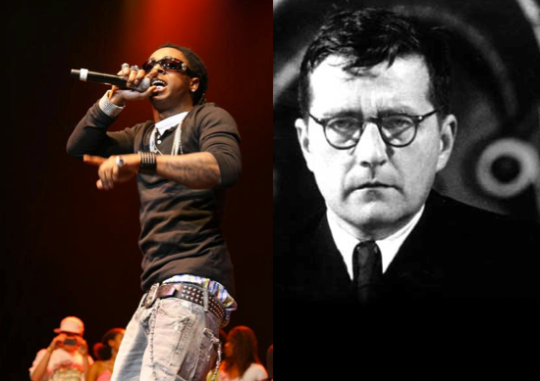A few months back, a colleague and I got into a heated debate about the value of various types of music. He expressed frustration with people who associated orchestral music purely with things like relaxing, studying, or providing a backdrop for a “refined” setting. On this point we couldn’t agree more. To my mind, anyone who calls all orchestral music relaxing or worse, boring, needs to sit in a corner with the second movement of Shostakovich Symphony No. 10 and think about what they’ve done.
Where we disagreed, however, was on the point of the value of popular music. “It serves no purpose, musically,” he said, “It’s just a repetitive beat with boring chord progressions.” That was where a more vehement argument began. The label of “classical snob” was one that he bore proudly, disdaining popular music he had dubbed useless. As a classically-trained musician eager to see the revitalization of my art form among people in my generation, this attitude strikes me as dangerous. The last thing we should be doing is disparaging the audience’s music tastes if we want to become more accessible to the public. The fact is that popular music bears an important sociological function, often representing the zeitgeist of the generation in which it was produced.
Granted, I believe that the bite-sized length, predictable chord structure, and user-friendly lyrics characteristic of pop have led to a shorter attention span and an expectation of transparency for most listeners. The symphony structure, by contrast, is lengthy and complex, and often contains layers that even seasoned listeners may not pick out without several listens or dedicated score study.
Impatience with these more complex forms goes hand in hand with media in general today. Lengthy, dense prose has largely been replace by sound bites, videos, and Buzzfeed-style articles. This is the new speed of the world. We are so driven by the visual that auditory experiences must be as simple, transparent, and attention-grabbing as possible in order to reach a wide audience. If my tone sounds nostalgic or reproachful of this paradigm shift, know that I have checked Facebook, Gmail and texts numerous times while writing this entry, and will probably end up taking a few breaks during the writing process. I know that despite my best efforts, Internet culture has shortened my attention span considerably. (Also, I become terribly concerned if a webpage takes longer than five seconds to load. At twenty seconds I will probably give up.)
All this is to say that a culture of short attention spans is not an environment that is likely to foster an interest in, say, a two-hour Mahler symphony. Popular music is a reflection of this culture. But do I disparage it?
Not in the least.
On long car trips, I often take time to listen to epic symphonic works. After finishing a lengthy, awe-inspiring work that takes me on an emotional journey, I often drive in silence for a few miles. How does one follow a work like Shostakovich Symphony No. 5 or Beethoven Symphony No. 9 or Mahler Symphony No. 3? Usually my go-to is something like Beyoncé. Maybe Justin Timberlake if Dvořák made me feel like bringing sexy back. Why? To me, music is like food.
Putting aside the idea of music as life-giving sustenance (which could be an entire entry in itself), I liken different genres to different types of food. Listening to orchestral music feels like eating a healthy, hearty meal. It engages my imagination and stimulates a variety of emotions that top 40 chart pop music often ignores (yes, there are emotions beyond “sexy time,” “look at all this money I have,” “sad because love is hard,” and “happy because love is great!” There are things like awe, existential despair, melancholy, and “Soviet Russia is oppressing me. Again.”)
After such a feast though, I’m ready for coffee and dessert. Cue Nicki Minaj and Maroon 5. There are other genres to consider as well. I often feel the same multi-course meal sensation after listening to a Radiohead or Pink Floyd album. Maybe Delta blues is like satisfying barbecue. Thievery Corporation could be tasty ethnic fast food. Björk is definitely that offbeat, ethereal molecular gastronomy cuisine that uses a lot of liquid nitrogen for the fun of it. At the risk of going entirely off the rails here and making you wonder how hungry I must have been while writing this, (answer: very) I’ll leave the rest up to your palate. I’d love to read your genre-cuisine connections in the comment box!
The point is that to my mind, variety is crucial to a well-rounded love of music. Spending one’s life listening exclusively to whatever is cycling on the pop station is tantamount to eating nothing but junk food. Easy, quick, and satisfying on the surface but often devoid of sustaining nutrition. By the same token, listening to nothing but Wagner is like eating nothing but steak, Oscar style, smothered in some kind of hollandaise.
So in conclusion, listen to Miley Cyrus all you want. Just know that if “Wrecking Ball” speaks to you, you may find similar (or even more visceral) satisfaction in the second movement of Beethoven Symphony No. 7.
I’m going to go eat dinner now.



Great article! I posted a comment but for some reason it didn’t appear. You are a thoughtful, articulate musician…wish there were more of you! Hope things are going well at SMU.